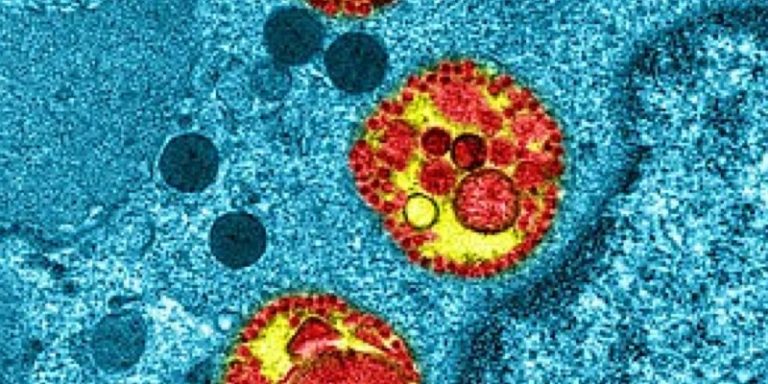
Why are some Covid-19 patients asymptomatic while others develop severe forms, notably ARDS (acute respiratory distress syndrome)? Researchers from Inserm and the University of Strasbourg within the U1109 “Immunology and Molecular Rheumatology” unit, in collaboration with clinician-researchers from the University Hospitals of Strasbourg, have studied the biological and genomic data of a targeted cohort of young patients. Patients hospitalized in the ICU with ARDS were compared with patients hospitalized in the conventional sector. These case studies led to the identification of a gene signature specific to severe forms of ARDS using artificial intelligence: the ADAM9 gene. The French researchers were supported by experts from Genuity Science (Boston) and the University of Southern California.
Patients infected with Covid-19 do not have the same symptoms at all. Four different reactions can be considered: asymptomatic form, flu-like syndrome, breathing difficulties requiring or not hospitalization and acute respiratory distress syndrome (ARDS) requiring respiratory assistance in intensive care. The latter category has the lowest number of patients but a very high mortality rate of 25%.
We know the impact of age and co-morbidities (diabetes, hypertension, cardiovascular disease, obesity, COPD, heart disease) on the evolution of severe forms of covid-19, but why do young people with no health problems develop respiratory complications or even ARDS, is there a molecular or genetic explanation? Numerous studies had previously been carried out worldwide, but all of them dealt with only one aspect of this problem.
Scientists from Inserm, the University of Strasbourg and clinician-researchers from the University Hospital of Strasbourg took an interest in a cohort of patients and controls with well-defined restrictive inclusion criteria and applied high-resolution molecular analyses to them. The results of their research have been published in Science Translational Medicine.
Two criteria for this cohort: young patients and no comorbidities
The study focused on a cohort of patients hospitalized during the first wave of the pandemic (March-April 2020) at the University Hospital of Strasbourg before the systematic use of corticosteroids. All were either discharged from hospital or had died by the time of the study.
Of the 72 individuals, 53 were men. The median age was 40 years (range 33-46 years). Two groups were formed. A critical group composed of 47 patients in intensive care for moderate to severe ARDS, 45 requiring invasive mechanical ventilation, unlike the other 2. The 25 “non-critical” patients in the second group were treated in a conventional room.
A group of 22 covid-19 negative patients was studied in parallel. Professor Seiamak Bahram is PU-PH, director of Inserm Unit 1109, head of the Interdisciplinary Precision Medicine Institute in Strasbourg and head of the Biological Immunology Department at the University Hospitals of Strasbourg. He stated:
“We made the choice to look at a small but very well-defined cohort of patients, excluding confounding factors such as age or certain pathologies, in order to be able to really study the molecular and genetic mechanisms directly associated with severe forms, which are exclusively related to the viral infection and not to other pre-existing risk factors.”
A comprehensive multi-omics analysis strategy was applied to identify the pathways and driver of ARDS from blood samples collected on hospital admission. According to Seiamak Bahram, it had the following objective:
“To analyze the genomic, proteomic, transcriptomic (investigation of the totality of messenger RNAs) and other virological, immunological and serological data of these patients. This allowed them to confirm that ARDS is associated with a very high inflammatory state and a runaway immune system (the so-called cytokine storm).”
The role of artificial intelligence
All the data collected in this study could not have been processed or analyzed without the use of artificial intelligence. Through a collaboration with the Artificial Intelligence Institute at Boston biotech company Genuity Science, the team was able to identify a network of 600 genes involved in the evolution to the critical forms of Covid-19, through the cross-application of several artificial intelligence algorithms (including one that ran on the quantum computer made available by the University of South Carolina). The study author stated:
“Also as part of this transatlantic collaboration, this large amount of data could be modelled and analysed with the help of AI, allowing us to more accurately identify five genes that were overexpressed in these patients. One of them, the ADAM9 gene, is a particularly interesting “driver gene”. Indeed, previous studies have shown that it interacts with SARS-CoV-2 proteins. The results obtained here are in line with this, suggesting that overexpression of ADAM9 would lead (hence the term ” driver gene “)
certain patients to severe forms of Covid-19 and ARDS. ADAM9 was identified as a severity factor in Covid-19 and a candidate therapeutic target. Blocking ADAM9 reduces the level of virus in cells and its replication. To confirm these results, further studies will need to be conducted but this therapeutic avenue is all the more interesting as clinical trials in oncology to test monoclonal antibodies that specifically inhibit ADAM9 are underway.”
Sources
Identification of driver genes for critical forms of COVID-19 in a deeply phenotyped young patient cohort, R. Carapito et al, Science Translational Medicine, October 2021- DOI: 10.1126/scitranslmed.abj7521
Translated from ADAM9, le gène impliqué dans les formes graves de Covid-19 identifié par l’intelligence artificielle









